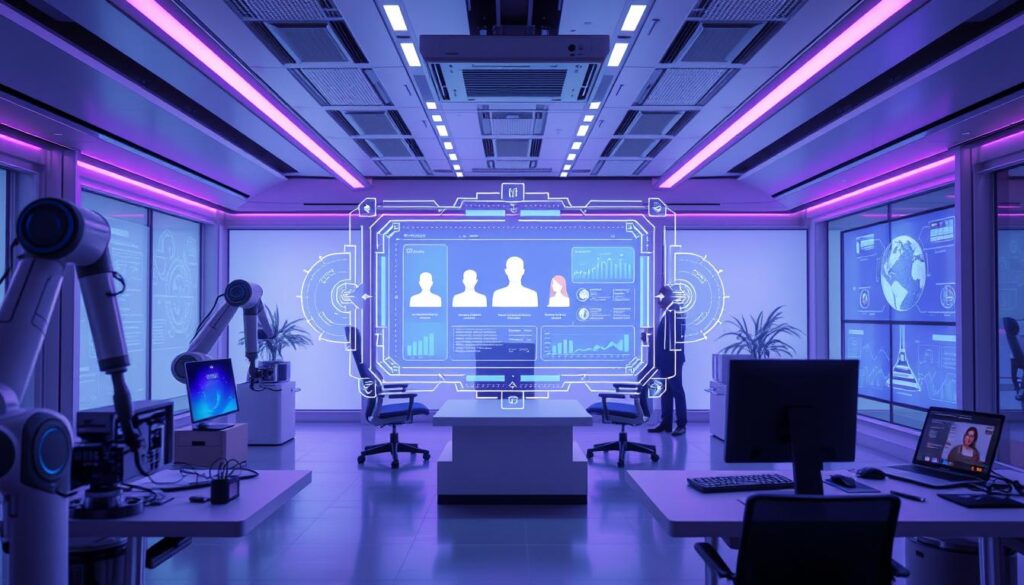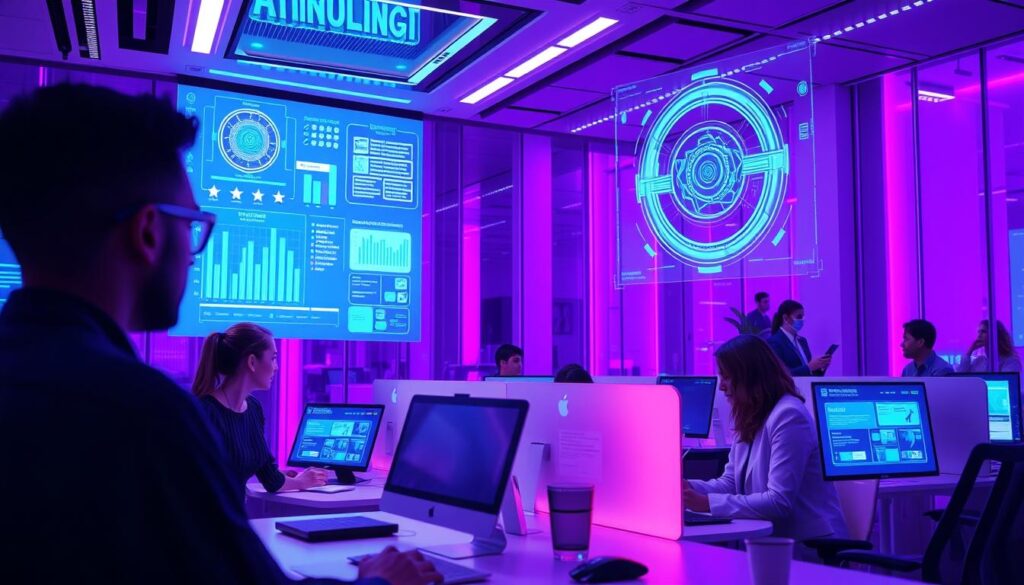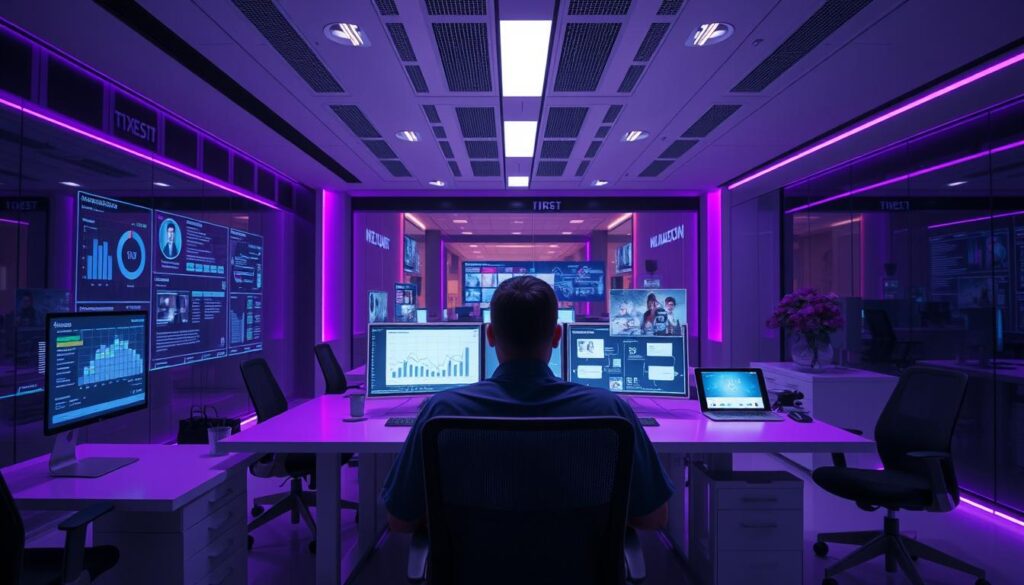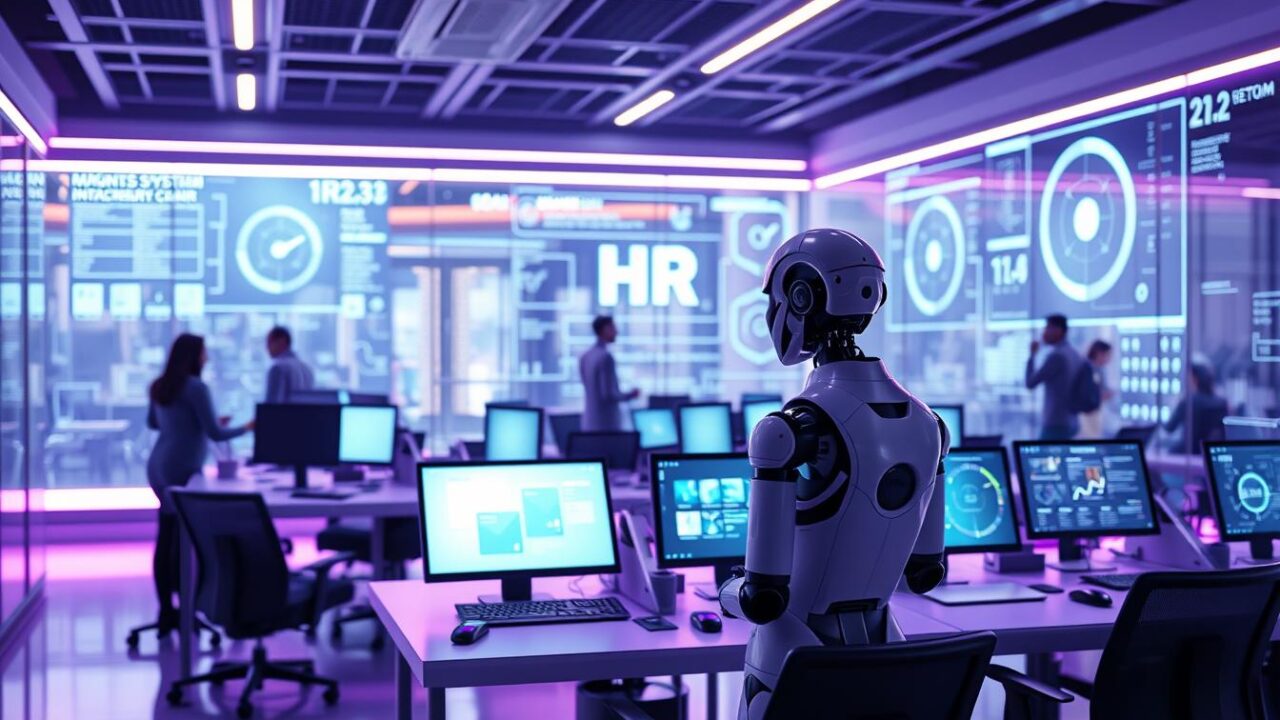Imagine a world where HR tasks are automated. This lets your team focus on growth strategies. That world is here, thanks to Artificial Intelligence (AI). A recent study shows over 60% of HR leaders use AI, changing how they manage their team.
Welcome to the AI-empowered HR era. This technology makes our work easier and unlocks new insights. It’s changing HR by making recruitment better, giving feedback, and creating personalized experiences.
Key Takeaways
- AI technologies have matured significantly, offering powerful tools to enhance HR processes.
- AI can streamline recruitment, improve employee engagement, and provide deep insights into workforce dynamics.
- AI-powered solutions can deliver incredible efficiencies in key HR functions, such as chatbots handling routine inquiries.
- AI can create dynamic, skills-based data structures to enhance the employee lifecycle and improve recruitment.
- Embracing AI in HR can transform organizations into agile, high-performing entities and guide HR teams towards strategic goals.
Revolutionizing Recruitment with AI-Powered Candidate Screening

The way companies find and hire the best talent is changing fast. AI is leading this change, making it easier to find the right people. Advanced AI tools use smart algorithms to make the hiring process smoother.
Leveraging AI Algorithms for Resume Analysis and Job Fit Prediction
Manual resume checks are a thing of the past. AI can now scan through many resumes quickly, finding important details that humans might miss. It looks at resumes and past hiring data to guess if a candidate will do well in a job.
Enhancing Efficiency and Quality of Hires with Automated Screening
AI has made hiring faster and better. HR teams can now find the best candidates quickly, saving time and improving the quality of hires.
“Unilever, a global consumer goods company, reduced time-to-hire and improved candidate quality by implementing AI technology for resume screening and initial interviews.”
AI has made hiring easier and better for everyone. It helps companies find the right people faster, making the hiring process better for candidates. This leads to a more diverse and inclusive workplace.
AI-Driven Onboarding and Personalized Training

Today’s workplaces are changing fast. They’re using artificial intelligence (AI) to make onboarding easier and training more personal. AI chatbots and virtual assistants are changing how new employees start their jobs.
Intelligent Chatbots and Virtual Assistants Streamlining Onboarding
Intelligent chatbots and virtual assistants are key in onboarding. They offer personalized help, answer questions, and make the transition smoother. They handle tasks like checking documents and orientation, so HR can focus on more important things.
Customized Training Programs with AI-Enabled Learning Platforms
AI is also changing how we train employees. It looks at what each person needs to learn and how they learn best. This way, training is tailored to each employee, helping them do their job better.
AI is making a big difference in HR. It makes onboarding and training more efficient and personal. This leads to happier, more productive employees, which is good for business.
“AI-powered chatbots and virtual assistants are revolutionizing the way new hires are welcomed and integrated into the company culture.”
Embrace the Future: Implementing AI in Your HR Workflow

Artificial Intelligence (AI) is changing how companies handle HR. It helps HR teams work better, make smarter choices, and offer a more personal touch to employees.
Recent studies show that about 40% of HR leaders are using or planning to use AI. It’s being used in many HR areas, like hiring, planning, and learning. This shows AI’s wide range of uses in managing talent.
Using AI well can make hiring and planning better. It helps make smarter choices about who to hire and where to place them. Companies using AI can use lots of data to make big changes.
HR leaders should pick AI tools that work well and fit their needs. It’s key to choose the right AI that fits with what they already have. They also need to make sure AI is used in a way that’s fair and trustworthy.
Introducing AI to HR means teaching employees about it. HR teams need training to use it well. It’s also important to get everyone on board, especially in new places.
“76% of HR leaders believe that by not adopting AI in the next one to two years, they will not be as successful as organizations that have embraced it.”
In short, AI in HR is not just a trend. It’s a must for a more efficient and personal way of managing talent. By using AI, companies can stay ahead and be more competitive in the changing job market.
Performance Management and Real-Time Feedback with AI
Artificial intelligence (AI) is changing how companies manage performance and grow their teams. AI tools help HR get instant insights into how employees are doing. This lets them focus on coaching and improving skills for lasting growth.
Data-Driven Insights for Targeted Coaching and Skill Development
AI tools look at data from many places, like reviews and surveys. They spot trends and areas where people can get better. This helps HR give feedback that really helps, helping employees grow.
AI helps managers avoid biases in reviews. It gives them past performance data. This way, companies can keep learning and growing, improving everyone’s skills.
“Fairness is the most important workplace quality according to respondents in the State of Performance Enablement report.”
AI in performance management boosts productivity and keeps employees happy. Studies show it makes employees more productive with tailored coaching.
HR leaders use AI to make better choices and improve work life. This keeps the team ready for the future and engaged.
Predictive Analytics for Talent Retention and Flight Risk Mitigation
In today’s fast-changing business world, keeping top talent is crucial. Predictive analytics helps us understand employee behavior and spot potential flight risks early. This way, we can act fast to keep our best workers.
A study by Insight222 shows people analytics teams will grow by 43% by 2023. This highlights the need for data-driven HR. By looking at past data and patterns, predictive analytics can predict who might leave. This lets HR teams create plans to keep these key employees.
Text and voice sentiment analysis is now used instead of old surveys. It gives HR leaders a better view of what employees think. This helps us talk to at-risk employees and keep them committed to our company.
“Predictive analytics is changing how we keep our best employees. It helps us act before they decide to leave,” says Alex Browne, HR Analytics Lead at Nestlé.
While predictive analytics in HR is beneficial, there are challenges. Integrating data from different sources and training teams are big ones. Keeping employee data safe is also a major concern.
Despite these challenges, companies that use predictive analytics in HR see big benefits. They save on hiring and training costs and see a 12% boost in employee performance. This shows how data-driven HR can lead to success.
As we move forward, using predictive analytics in HR will set us apart. It helps us focus on our people and make better decisions. With these insights, we can build a workforce that is ready for the future.
Personalized Employee Experiences with AI-Powered HRMS
Organizations are quickly moving to digital transformation. AI-driven Human Resource Management Systems (HRMS) are changing how we support our employees. Now, we can offer personalized experiences that meet each person’s needs, creating a welcoming culture.
Tailoring Benefits, Rewards, and Career Development Opportunities
AI-powered HRMS lets us customize benefits, rewards, and career paths for each employee. It uses predictive analytics to understand our workforce better. This way, we can create benefits packages and career paths that really speak to our employees.
For instance, our AI can spot top talent and offer them special coaching and development. This aligns with our company’s goals, making our talent management focused on our people’s growth.
“AI integration in HR has resulted in HR professionals being able to focus more on strategic aspects of their roles, such as designing personalized development programs and building a thriving employee culture.”
AI-powered virtual assistants and chatbots also improve the employee experience. They offer instant support, answer questions, and help with onboarding. This makes the start of a new job smooth and engaging.
By using AI in HRMS, we boost efficiency and create a more empowered workforce. As we move forward, AI will be crucial in unlocking our employees’ full potential.
Harnessing AI for Strategic Workforce Planning
Organizations are now using AI tools to match their talent management with business goals. This helps HR leaders make sure their team supports the company’s long-term goals. Strategic workforce planning and ai-powered talent management are key to this success.
AI analytics give HR insights into workforce trends. This helps them make better decisions. AI predicts skill needs and spots skill gaps, aligning HR strategies with the company’s goals.
Aligning Talent Management with Organizational Goals
HR departments are using technology to boost productivity all year. AI and new tools are changing HR, helping it face future challenges.
- AI tools check employee progress and adjust training to keep the team skilled and engaged.
- Predictive AI analytics spot potential turnover and engagement issues, helping HR act early to keep talent.
- AI automates tasks, letting HR focus on strategy and people, making the company more agile.
By using strategic workforce planning and ai-powered talent management, companies can align their HR strategy with organizational goals. This sets them up for success in the fast-changing business world.
“AI has become an essential part of adapting to the future of work for proactive leadership.”
AI and the Future of HR: Upskilling for a Digital Workforce
The world of work is changing fast. For HR professionals, using artificial intelligence (AI) is now essential. Upskilling for a digital workforce is key to the future of HR.
Studies show a gap between what executives think and what employees feel about learning opportunities. HR leaders must close this gap. They need to empower employees to succeed in the digital age.
AI is helping HR in this challenge. AI-driven upskilling programs are ten times more engaging than old methods. They offer personalized learning experiences. AI automates tasks, analyzes data, and tailors training to fit the company’s goals and employee needs.
“AI is expected to continue revolutionizing the HR industry in the upskilling domain, with a focus on personalization and efficiency enhancements.”
The future of HR is about using AI to prepare the workforce for tomorrow. Companies that upskill with AI’s help will stay ahead in the fast-changing work world.
As ai and the future of hr, upskilling for digital workforce, hr digital transformation, and skills for the future of work shape HR, tomorrow’s leaders will use AI in upskilling. They will focus on people and technology in talent management.
The future of work is here, and HR must be ready. By using AI to upskill, HR can build a strong, future-ready team. This team will thrive in the digital world.
Ethical Considerations and Responsible AI Integration
As companies use AI in HR, we must be careful and ethical. We need to handle data privacy, bias, and AI rules well. This ensures AI benefits everyone without harming values.
Keeping employee data safe is key. We must protect it well and be open about how it’s used. Using things like data anonymization helps prevent data leaks.
Bias is a big issue with AI. It can make hiring and other HR tasks unfair. We need to check AI for fairness and include many views in its making.
Having a strong AI plan is vital. It sets rules, roles, and who’s accountable. This keeps AI use ethical and follows the law and company values.
“The balancing act between advancing technological innovation and ensuring AI benefits society without compromising human values is crucial in maintaining ethical AI integration in HR practices.”
By focusing on ethics, AI can make HR better. It can make work smoother and improve employee happiness. All while keeping things fair and open.
Getting AI right in HR takes teamwork. Employees, HR, and tech experts must work together. This way, AI can make work better for everyone and help our companies and communities grow.
Conclusion: Embracing AI for a People-Centric, Future-Ready HR
The use of AI is changing HR, making it more efficient and effective. It helps us manage people better and prepare for the future. By using AI, we can improve how we treat employees and manage talent, leading to success in the digital world.
Statistics show that 76% of HR leaders think AI is key for staying ahead. Companies using AI in HR save 93% of time and cut costs by 67%. It’s time for HR to step up and thrive in the tech age.
Introducing AI in HR must be done with care for ethics and privacy. We need to learn about data analysis and AI ethics. This way, we can use AI to help our employees and the company. By doing this, we make HR ready for the future, embracing new challenges and opportunities.
FAQ
How is Artificial Intelligence revolutionizing HR processes and talent management?
Artificial Intelligence is changing HR in big ways. It’s making HR systems smarter and more efficient. AI helps HR teams make better decisions and give employees a more personal experience.
How is AI transforming the recruitment and hiring process?
AI is now a big part of hiring. It looks at resumes and checks if candidates fit the job. This makes finding the right people faster and better.
AI is also changing how we hire. It’s making the process more efficient by cutting down on time spent on resumes.
What are the benefits of using AI for employee onboarding and training?
AI is making onboarding easier for new employees. It gives them personalized help and answers their questions. This makes the start of their job smoother.
AI also helps with training. It creates programs that fit each person’s needs and learning style. This helps employees grow and stay engaged.
How can AI-powered analytics improve performance management and talent retention?
AI analytics give HR real-time insights on how employees are doing. This helps give better feedback and support. It also helps keep employees happy and on board.
AI can even predict when employees might leave. It helps find ways to keep them from going.
How can AI-powered HRMS platforms deliver personalized experiences for employees?
AI-powered HRMS platforms make things personal for employees. They help with everything from benefits to career plans. This makes employees feel valued and included.
What skills will HR professionals need to develop to adapt to the changing landscape driven by AI?
HR directors will need new skills as AI grows. The World Economic Forum says skills like emotional intelligence and programming will be key. These skills will help HR keep up with AI’s changes.
What are the ethical considerations and responsible integration of AI in HR?
HR must think carefully about AI. They need to make sure AI is used in a way that respects privacy and fairness. This is important for AI to work well in HR.
Want to hire me as a Consultant? Head to Channel as a Service and book a meeting.

